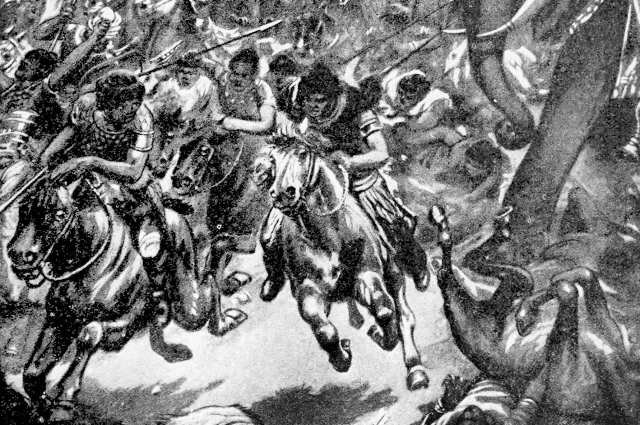Empires rise and fall, much like the sun that ascends every morning only to descend by evening. However, their legacies stand tall. The Cholas, the Mauryas, and the Guptas, are some of the great empires that shaped the Indian subcontinent. They continue to live on in our collective memory, celebrated for their achievements. Yet, among them stands a forgotten warrior-king, Yashodharman, whose contributions were equally remarkable but have faded with time. Once the ruler of Malwa, he was a fierce warrior who not only defeated the Hunas and their ruler Mihirakula but also safeguarded India from foreign domination.
The Rise of Yashodharman
Yashodharman hailed from the Aulikara dynasty and ruled over the Malwa region, specifically Dashapura (modern-day Mandsaur, Madhya Pradesh). Unlike many rulers who inherited vast empires, he built his own through military prowess and strategic brilliance. At a time when the Gupta Empire was in decline, and North India found itself in a power vacuum, attracting the greedy emperors looking to loot India. Among them, the Hunas, led by Mihirakula, emerged as the most formidable threat. While many rulers of the time submitted to the Hunas or sought to coexist, Yashodharman saw subjugation as a fate worse than death. He believed in India’s sovereignty and took it upon himself to battle the invaders.
The Battle Against Mihirakula (528 CE)
The Hunas were a fearsome force, known for their brutality and reliance on large armies to overpower opponents. Mihirakula, the king was particularly ruthless, destroying cultural places, and terrorizing local populations. While many North Indian rulers surrendered, Yashodharman refused to yield to someone like that. In 528 CE, Yashodharman, along with King Narasimhagupta Baladitya of Magadha, confronted Mihirakula. Unlike what some claim, he did not solely rely on guerrilla warfare. Instead, he engaged in conventional battlefield tactics and siege warfare to weaken the Hunas before delivering a decisive blow. His strategy worked, and in a historic victory, he captured Mihirakula and forced him into submission. According to some records, he humiliated Mihirakula but later released him, allowing him to flee to Kashmir, where he continued ruling for some time before being overthrown. This triumph was not just a military success but a bold declaration: "India would not bow to foreign invaders."
Yashodharman’s Vision and Administration
Unlike many war-driven rulers, Yashodharman was a gentle person outside of battle field. Enjoying and rejoicing in different art of different culture. His inscriptions mention his ideology and belief of protecting Dharma and tolerance for multiple religions. His administration, though not as structured as the Mauryas or Guptas, aimed to restore stability in a fragmented India. However, his empire was short-lived. Unlike Ashoka or Chandragupta Maurya, he did not establish a lasting dynasty. His rule ended mysteriously, possibly due to his untimely death, and without a strong successor, his empire quickly disintegrated, and was forgotten.
The Forgotten Legacy
Despite his remarkable achievements, Yashodharman’s legacy faded soon after his death. Unlike the Mauryas or Guptas, he did not establish a dynasty or leave behind an enduring administrative structure. Another key reason for his obscurity was the lack of historical records. Unlike Ashoka, whose edicts and inscriptions were scattered across the subcontinent, Yashodharman’s legacy is confined to a few inscriptions in Malwa. No poets, artists, or chroniclers preserved his story for future generations. As a result, his name was gradually erased from mainstream historical narratives.
Yet, his contributions remain significant. Had he not fought the Hunas, would India have remained free, or would its fate have been far worse?
Reigniting the Lost Glory
Yashodharman’s story is a stark reminder that history is written by those who endure, not always by those who were the most impactful. His defiance against foreign invasions and his role in securing India’s sovereignty make him a figure worthy of admiration. His rule serves as a lesson in courage, strategic brilliance, and patriotism. Though time may have faded his name, his resistance against Mihirakula remains a defining moment in India’s history.
Perhaps it is time to reclaim Yashodharman’s legacy and give him the recognition he truly deserves.

